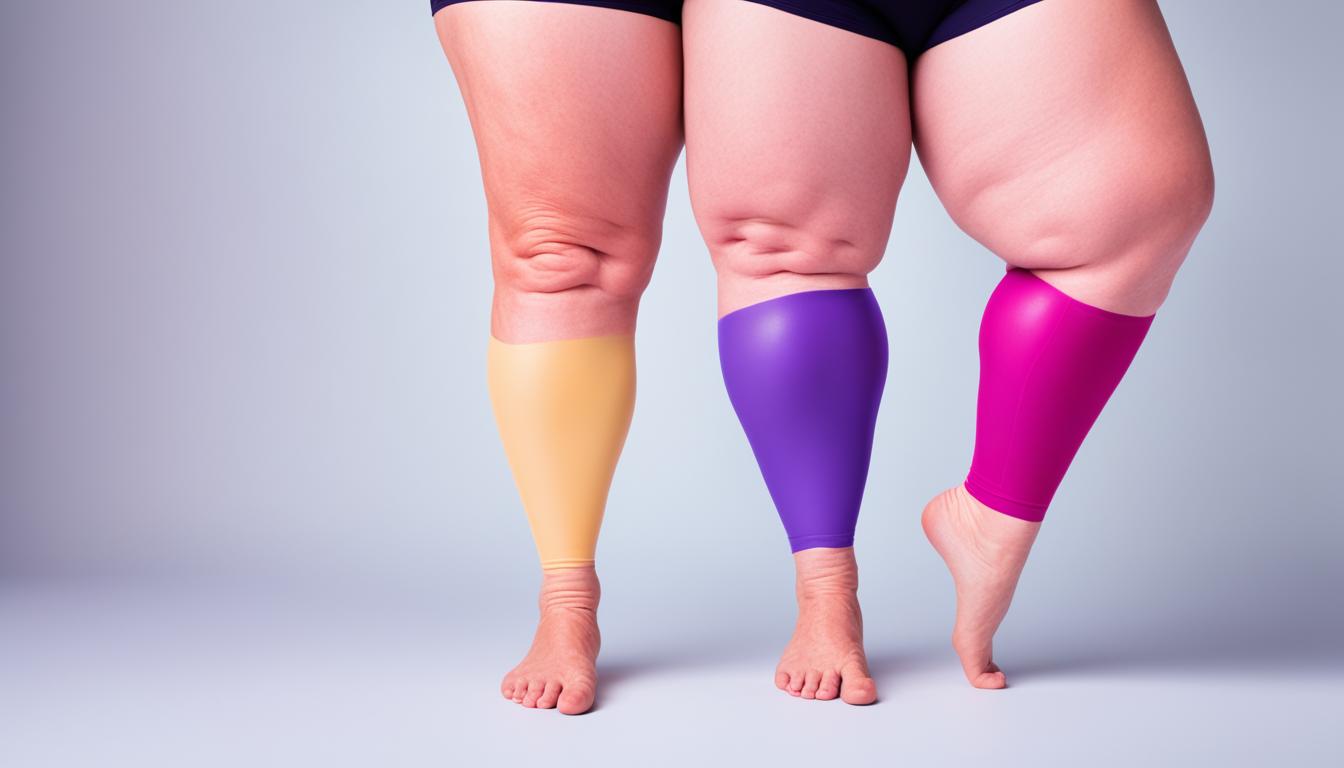Lipedema Management: Optimal Diet for Relief & Control
Did you know that an estimated 11% of women worldwide suffer from lipedema? This chronic condition is characterized by an abnormal accumulation of fat cells in the legs, buttocks, and sometimes arms, resulting in pain, swelling, and reduced mobility. While there is no cure for lipedema, adopting the right diet can play a crucial role in managing its symptoms and improving quality of life.
Key Takeaways:
- Following a dedicated diet is essential for managing lipedema symptoms.
- The Rare Adipose Disorder (RAD) diet, a modification of the Mediterranean diet, is recommended for individuals with lipedema.
- Avoiding refined and processed starches and sugars, and identifying dietary inflammation triggers are key dietary guidelines for lipedema management.
- An anti-inflammatory diet and a low-carbohydrate, high-fat (LCHF) diet have shown promising results in reducing inflammation, managing weight, and alleviating pain in individuals with lipedema.
- In addition to diet, vitamin supplements, and medications like Guaifenesin can aid in reducing swelling and inflammation in lipedema.
Benefits of an Anti-Inflammatory Diet for Lipedema
Inflammation can significantly contribute to the symptoms of lipedema. By following an anti-inflammatory diet, you can effectively manage these symptoms and promote relief. This type of diet emphasizes the consumption of a variety of colorful vegetables and fruits, whole grains, lean proteins, beans, fermented foods, and herbs and spices. These nutrient-dense foods contain anti-inflammatory properties that can help reduce swelling and pain associated with lipedema.
When following an anti-inflammatory diet for lipedema, it is important to avoid foods that can aggravate inflammation. This includes added sugars, refined grains, chemically modified fats, high-salt foods, fatty proteins, and dairy products (except for kefir or yogurt). By eliminating these inflammatory triggers from your diet, you can effectively manage lipedema symptoms and prevent further inflammation.
Scientific evidence also supports the effectiveness of a ketogenic diet for lipedema management. This low-carbohydrate, high-fat eating plan controls glycemic peaks and encourages the body to rely on proteins and fats for energy. By limiting carbohydrate intake, maintaining a balanced ratio of proteins to fats, and incorporating a high intake of vegetables while minimizing sugar intake, individuals with lipedema can experience reduced inflammation, improved pain management, and overall symptom reduction.
By following an anti-inflammatory diet and considering a ketogenic approach, individuals with lipedema can take control of their diet to reduce inflammation, manage symptoms, and improve their overall quality of life.
The Efficacy of a Low-Carbohydrate, High-Fat (LCHF) Diet for Lipedema
A study conducted on women with lipedema and women with overweight/obesity compared the effects of a low-carbohydrate, high-fat (LCHF) diet on body composition, leg volume, and pain reduction. The study found that both groups experienced a similar weight reduction and significant reductions in body fat mass.
The LCHF diet also led to improvements in several parameters, including leg volume management and pain reduction, with lipedema participants experiencing a significant decrease in pain levels. These findings suggest that a LCHF diet holds promise for weight loss, body fat reduction, leg volume management, and pain alleviation in women with lipedema.
Additional Strategies for Lipedema Management
In addition to following a dedicated diet, there are various strategies that can help effectively manage lipedema symptoms. Alongside nutritional interventions, incorporating targeted supplements into your routine can aid in reducing swelling and inflammation.
One option worth considering is the use of lipedema supplements, such as Vitamin D3, selenium, and Diosmin. These supplements have been found to have anti-inflammatory properties and can contribute to relieving lipedema-related swelling and inflammation.
Furthermore, another potential management strategy is the utilization of Guaifenesin. While commonly known as an expectorant medication, it has shown promise in reducing lipedema swelling and inflammation, offering a potential solution for those seeking relief.
It is essential to seek personalized advice from a doctor or nutritionist who can guide you in choosing appropriate dietary patterns and supplements that align with your specific needs and preferences. This individualized approach ensures optimal results and effective lipedema management.
Additionally, holistic lipedema management should take into account your mental outlook, physical status, and overall well-being. Incorporating mindfulness exercises and breathwork can support total body health and enhance lipedema management efforts.
Source Links
- https://www.lipedema.net/nutritious-eating-to-reduce-lipedema.html
- https://www.lymphapress.com/blog/lipedema-diet-and-inflammation-tips-you-need-to-know/
- https://www.ncbi.nlm.nih.gov/pmc/articles/PMC10676278/
- George Conway Weight Loss: My Healthy Journey! - May 19, 2024
- Menopause Diet: 5-Day Plan to Shed Pounds - May 18, 2024
- Diet Cranberry Juice: My Healthier Sip Choice - May 16, 2024





Post Comment
You must be logged in to post a comment.